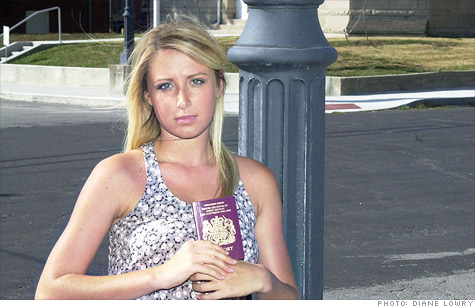Search News

Although she grew up in Missouri, Lauren Gray might soon be forced to return to England. She turns 21 on Wednesday and can no longer stay on her parents' business visa.
NEW YORK (CNNMoney) -- Even as the economy has slowed, the nation's visa system remains a high hurdle for foreigners who want to start businesses and create jobs in the United States.
Few viable options exist for entrepreneurs eager to come to America, and those that do offer little predictability.
For example, the investor visa carries a $1 million price tag -- too high for most aspiring small business owners. And the so-called executive visa requires immigrants to start a firm abroad and create a U.S. subsidiary.
For those who want to launch in the United States, the principal route is through E-2 visas. But they're available only to people in certain nations, prohibiting entry from the world's most promising countries, such as Brazil, India and China. Also, they must be renewed every few years and offer no path to permanent residency.
The U.S. policies are at odds with other countries that are opening doors for entrepreneurs. They have the ideas, build the companies, create the jobs. Why not invite them in?
Chile does it by offering $40,000 of equity-free capital and temporary visas. Singapore sets a low bar for "EntrePasses" and creates an avenue for residency.
Meanwhile, the U.S. immigration system can be openly hostile, say business owners, advocates and lawyers.
For a British couple who came in 1995 to manage a hotel and restaurant in Missouri, it might mean soon sending their eldest daughter back to a country she barely knows.
Ali and Ian Gray came on E-2 visas, and the program allowed them to bring Lauren, then four years old. She grew up on the flat plains, was a cheerleader in high school and studied dance at a nearby women's college.
But she will no longer be able to stay on her parents' visa as of Wednesday, when she turns 21. She can try and get her own visa but she's been on that list since she was 12. The U.S. immigration system is so backlogged she's still in line.
"It's just not right and not fair. I am an American," Lauren said. "I had so many plans here, so many options, so many connections. I'm going to have to learn an entire new culture.
No consideration is given to her family's economic contribution to the tiny Midwestern town of Trenton, where they've doubled the staff at the Lakeview Motor Lodge and Restaurant to 30.
In a last-ditch effort, Lauren and her mother traveled to Washington, D.C., last week to meet with congressional staffers to plead for a solution. They faced resistance.
"It's so frustrating," Lauren Gray said. "They know the system is broken, but they still enforce it. No one seems to think anything can be changed, so they've given up."
The family is trying to get an exemption, but it's still uncertain.
For entrepreneurs with an eye toward the United States, it's an ominous warning: You can come here and hire Americans, but expect no gratitude.
Another problem with the E-2 visa is that renewals aren't guaranteed.
A married couple from Ireland that owns a restaurant in New England experienced that first hand earlier this year.
In February, they returned to Ireland to renew their visas, as they had done every two years for almost a decade. While there, U.S. immigration officials denied the renewal and wouldn't let them back in to shut their business. The restaurant, which had three employees, eventually closed.
It took six weeks and creative legal moves to get them in temporarily and reunite them with their children. They've asked to remain unnamed, fearing retribution in a system without recourse.
Still, the E-2 visa program is popular. Since 2009, at least 33,000 applications have been filed every year; on average, 25,926 visas were issued annually. But its narrow options "discourage investment," said Brent Renison, a Portland, Ore., immigration attorney representing the Grays.
"People need to be assured that if they're putting all this money into the United States, they can stay here," Renison said.
The U.S. State Department, which issues visas, told CNNMoney it can only follow orders from Congress.
A proposal that seeks to change that was introduced in a House bill in late July by Rep. John Conyers, a Democrat. It would offer green cards to business owners here on E-2 visas who hire at least five Americans.
The bill's Republican co-sponsor, Rep. Jason Chaffetz, said it starts to chip away at a system that is broken "top to bottom."
"If we fix legal immigration, the country will be better off," Chaffetz said. "It's good for our economy, and it's good for our vitality."
However, it's doubtful whether Congress can come together to address an issue as divisive and complex as immigration, especially during an election year. ![]()